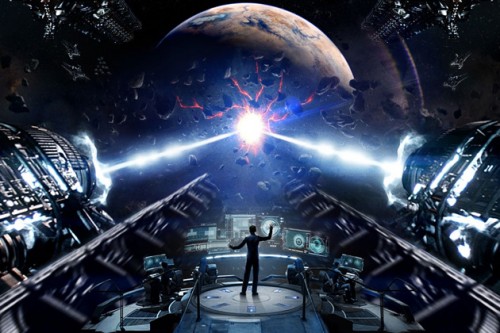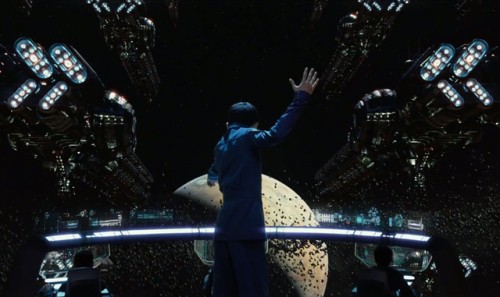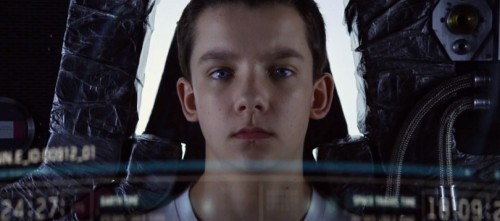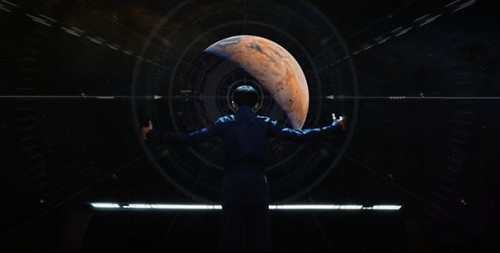Alert to fanpeople: The film version of Ender’s Game is not the sprawling political epic Orson Scott Card created in the Ender series. Alert to those unfamiliar with the story: The film is, however, a lean and contemporary plunge into questions of morality mediated by technology, and in order to tease out various issues, I’m gonna spoil the heck out of both book and film.
If you’re watching hoping to have your heart yanked out and shaken, you’ll probably be disappointed. Asa Butterfield’s guileless face makes a plausible approximation of the story’s world-weary protagonist, Ender, but he struggles to bring emotion to an over-trimmed, manically paced story. Minor conflicts are presented in expository dialogue and resolved before we have a chance to parse Harrison Ford’s (aka Colonel Graff’s) cranky barks. Minor characters are sketched in a single phrase, and the world appears divided into cute children who drift inevitably into Ender’s circle, and less typically-bodied children whose essential malice leaves them beyond redemption. Hood does a decent job of not Hollywood-izing the story beyond recognition: Here is Ender, cerebral, tormented, pubescent strategic genius in a world where children’s minds are employed as the best military defense against an alien enemy. Ender is taken from his home to Battle School in space, subjected to increasingly grueling battle simulations, and, in his final moment of victory is devastated to learn that the simulations were actually the real war. Without realizing, he has annihilated the aliens’ home planet.
From a distance, book and movie appear relatively congruent. But how boring it is to measure a film only in terms of its faithfulness to/distortions of an elder text. In this case, with a plot so predetermined, creative decisions primarily lie in the relative intervals allotted to each moment: which facts of the book are omitted, which are collapsed, and which few are lingered over. Through strategic elisions and subtle reinventions, Hood nudges the story toward 21st century relevance.
Card described his novel as being about “a child, our ultimate icon of vulnerability, put under almost impossible stress.” In the novel, the child’s innocence is what makes him the perfect candidate for command. Veteran strategist Mazer Rackham explains, “Any decent person who knows what warfare is can never go into battle with a whole heart. But you didn’t know. We made sure you didn’t know. You were reckless and brilliant and young.”
Today “the child” is a figure in flux, laden with multiple contradictory assumptions. Bemoaning the lost innocence/freedom of yesteryear’s childhood is as popular as ever. We fear our children’s from-birth immersion in technology, the new permanence/publicity of their actions. “Sheltering” becomes complicated, questioned, as kids independently gain access to (digital) environments demanding more complex assumptions of responsibility. Peril lies in their unnerving technological prowess; they might outstrip us, we fear, they might venture too far for us to follow. The child remains a locus of anxiety, but she is emphatically not “our ultimate icon of vulnerability.”
Rooted in the present moment, Hood’s movie presents us with a world in which children are useful not because of their naivete but because, as a voiceover explains, “They have grown up with games.” The shot accompanying this voiceover is of young people engrossed in souped-up tablet computers that they control with their minds. Children have not yet learned to perform the mature distancing maneuver that separates out some experiences as being “just games.” This is manifest in the opening scene where Ender humiliates and enrages an older boy by beating him at a computer game, precipitating a physical fight.
Similar to their lack of instinct for separating “the real” from “mere games,” children are least likely to dismiss experiences mediated by digital technology as “less real.” In the opening scene boy who loses the video game to Ender feels the injury to be infuriatingly, unquestionably real. Constantly interacting with their peers through games, immersed in digital technology, children lack the programming to perceive a dualistic separation between either games or digitally-mediated experiences and “the real.”
In a world in which interplanetary conflicts play out on screens, the government needs commanders who will never shrug off their campaigns as merely “virtual.” These same commanders must feel the stakes of their simulated battles to be as high as actual warfare (because, of course, they are). Card’s book makes the nostalgic claim that children are useful because they are innocent. Hood’s movie leaves nostalgia by the roadside, making the more complex assertion that they are useful because of their unique socialization to be intimately involved with, rather than detached from, simulations.
Gavin Hood has repeatedly expressed hope that viewers will extricate the story’s themes from its originator’s hateful politics. A valid wish, but complicated by the fact that problematic messages abound within the novel. In Slate David Haglund details the homophobic undercurrents in Card’s depiction of Battle School. John Kessel, in one of the most incisive critiques of the novel’s morality, delves deeper: “The novel repeatedly tells us that Ender is morally spotless; though he ultimately takes on guilt for the extermination of the alien buggers, his assuming this guilt is a gratuitous act. He is presented as a scapegoat for the acts of others… In this Card argues that the morality of an act is based solely on the intentions of the person acting. The result is a character who exterminates an entire race and yet remains fundamentally innocent.”
The novel is built around concept of morality determined by intent, embodied in a child whose innocence is assailed by cynical adults, whose trauma comes from his inability to reconcile that innocence with the terrible acts he has (unwittingly) committed. Ender’s superior, Colonel Graff, hammers the point home: “You had to be a weapon, Ender… We aimed you. We’re responsible. If there was something wrong, we did it.” Ender’s reaction (in the novel) to learning that he has won the war conforms to this logic: “I didn’t want to kill them all. I didn’t want to kill anybody! I’m not a killer! …You tricked me!”. Notice the obfuscating slide from “I didn’t want” to “I am not.” Intention is identity; outcomes are irrelevant. God knows what is in your heart; this is the basis for your salvation.
In one of the most important elisions of the movie, Gavin Hood jettisons this contorted moral logic. He is upfront about it: “The thing that’s most interesting to me is the idea that Ender has to come to grips with his own nature and not blame anyone else. Through the whole movie, he is torn between the compassion he has… and his capacity for aggression… And I thought that that idea of Ender taking personal responsibility for how he’ll live his life going forward, and his struggle with the duality of his nature was important…”
The child is not an innocent, not a tool. He is a citizen fluent in the technology of his world. It would be inconsistent if Hood had made him uncertain about whether his actions in that world bore moral weight. One’s deeds and their impact—within a game as in reality—determine one’s identity. It never occurs to (movie) Ender to protest that he is good, or not-a-killer. Instead, he gives an unsparing analysis of his own motives: “That’s what they want from us. Follow the rules, you lose, choose violence, you win.”
It is noteworthy that the movie transforms piloted fighter ships of the novel into drones transported by manned freighters. The alteration runs deeper than a facile desire to participate in trending conversations; it is part of crafting a coherent/plausible future world. In fact, the movie does not trifle with debates over the “distancing” effects of drone warfare. It takes for granted that we feel the full moral implications of the violence we accomplish through drones. (In Cyborgology posts here and here, Sarah Wanenchak suggests that augmented warfare may even have a humanizing effect.) Witness the reactions of the world leaders and military commanders in the moment after Ender wins the final battle. In the book, he turns in confusion to see them hugging each other and shouting for joy. In the movie we are privy to the moment before Ender turns; we pan over faces frozen in shock and horror. Soon they will celebrate, but, in that first instant, they reel with understanding of the devastation they have wrought.
The film implies that Ender believes the forthcoming real battles would be carried out using the same interface as the simulations. So here I hazard a vital distinction: Ender treats the final battle as a game because he has been told it is a game, not because of inherently “game-like” qualities of drone warfare. His reaction to his superiors’ disclosure of the truth bears this out. (In a wry reversal of the “it was all a dream” trope, here the dream is real.) As already discussed, protestations of “I’m not a killer” are conspicuously absent; instead his rage takes more tactical lines. He excoriates Colonel Graff: “We don’t know what they were planning! We don’t know if we destroyed all of them.”
Graff’s rebuttal: “We won, that’s all that matters.” How easy, morality written by the victors. Even easier than morality-by-intent. Ender’s ferocious final rejoinder: “How we win matters too.” His statement encompasses consideration of life after war. He thinks of the legacy of the military and also the recuperation of his own mind. Morality as continuing struggle, not definitive statement.
Movie Ender does not feel his identity threatened. He clings to no notion of his own essential goodness, but accepts that his character encompasses both aggression and empathy. His fury does not come because he was “tricked” into betraying himself. He rages because, not knowing the battles were real, he was deprived of the ability to make the moral (and tactical) adjustments he would have made in a real war. 2013 demands an Ender Wiggin who is not an innocent child, but a complex person seeking moral subtlety. Not an alienated drone operator, but a soldier merged with his virtual violence to the extent that he staggers under its weight.
Like the book, the movie takes on a new tone for its final, post-war act. The supporting characters, always thin, now melt away completely. We are left (as we always were) with only Ender, desolate, pursuing atonement for the genocide. Unlike the book, here atonement means coming to terms with the complexity of his nature, not a quest to reaffirm his jeopardized claim on innocence. Technology offers no framework of good and evil. His best chance at redemption comes, like his wrongdoing, via a simulation. Through a psychological video game provided as recreation in Battle School, the aliens find a way to enter Ender’s mind. Within his psyche they gain knowledge of him and impart knowledge of their species. It is never questioned that both ultimate extermination and ultimate empathy are mediated through technology. Ender, apostheosis of the so-called “digital native,” describes his actions only in elemental terms “In that very moment when I love [my enemy]—I destroy them.”
Odd to ascribe such emotional depth to a movie that, at first viewing, comes off terse and sterile. But in Gavin Hood’s rush to check off various plot-points, it is easy to miss how strategically he picks and chooses. The result, despite the thinness of the characters, crafts a narrative to help us to grapple with the most urgent of contemporary moral quandaries.
The film is uninterested in the mitigating effects of innocence or ignorance. It is a movie for a world in which technology provides us with ever more intimate and detailed knowledge of exactly what crimes we commit. Neither cruelty nor empathy reside in the devices we use, the games we play. Those impulses live in us, intertwined, and in each new historical moment we must find new ways to confront them, that we may continue to enact the most humane versions of ourselves. In the aftermath of atrocity we are offered neither absolution nor martyrdom as an out; we are boxed as neither innocents nor cynics. We are only (as ever) fully responsible humans, left to grapple, painfully and alone, with what we have become.
***
Abbey Otis (@poemegranate) writes about marginalized people, marginalized media & marginalized genres as a Michener Fellow in Fiction at UT Austin.




Comments 2
Jesse — November 5, 2013
I guess I've read and reread EG so many times that the themes and ideas conveyed by Card in the novel are fossilized in my mind as what EG should be. That's probably the genesis of most of my problems with the movie.
I can appreciate Hood's aim to create an Ender that grapples with his empathetic and violent sides, but since all he delivers to that end are a few melodramatic lines for Ender to voice over or complain to Valentine, it doesn't doesn't seem as though this reimagining was achieved.
One of the most critical aspects of the novel, to me, was Ender's deterioration/mental unraveling as he's pushed to endure a crazy pace, without reprieve, while dealing with increasingly unmanageable challenge. In Hood's "rush to check off various plot-points," I think this idea, that the process is what matters, gets lost. We get little snapshots of the critical moments in Ender's progression through battle and command school, and again, Hood's screenplay shouts it right at us, but it's too little to frame an adequate picture of Ender as exhausted and tired, worn past what can be endured. And without evidence for Ender's fraying mental state, there's much less pull to empathize with him in his breakdowns.
I can understand that in condensing a novel into 2 hours, some things have to fall by the wayside, but it seems like Hood took that as justification enough to make almost every supporting character upsetting one-dimensional. Bean is reduced from a rebellious genius to Ender's little upbeat friend. Graff, persistently/dutifully explaining away minor conflicts, tells Ender to "let Bean improvise," but we see none of Bean's own frustration with lack of recognition and respect. The combination of thin characters with stilted script make Ender's conflicts with Stilson and especially Bonzo seem out of the blue. Gone is the Bonzo who is driven mad by Ender's constant outperformance and the praise showered upon Ender but withheld from him, and in his place is a Bonzo so innately evil that he has to fight Ender as soon as he is annoyed.
And generally, raising the kids' ages creates a whole host of issues. While the crisis of kids not being able to separate reality/themselves from the game or simulation they play works when you're dealing with 6 or 8 or 10 year olds, it becomes significantly less plausible when teenagers are substituted onscreen. Their behavior seems jiltingly irrational, immature. Stilson and Bonzo's anger is unbelievable when they are clearly in their teens rather than in single digits. It was only during the "Ender sasses Dap" scene that he seemed to be acting age appropriately, but then he goes right back to being whiny and crying rather than angry and disillusioned. In the book, Bean the toddler is the only character that really adopts a teen-esque fuck-this-bullshit attitude, which makes me even more upset that he's so dumbed down.
While the almost-romance of Ender and Petra does seem a little more fitting to their apparent ages, it also demonstrates a deviation from Petra's role in Card's novel. Where she was once excitingly aggressive, the girl who got into Battle School, a stark contrast to Valentine's tenderness, Petra is now softened into a friendly companion for Ender. Her own deterioration as Ender relies to heavily on her tactical brilliance is ignored. Instead, she holds hands with Ender, sleeps by his bed, waits for his specific instruction to use the MDD. In the same vein, the change of Maj. Anderson's gender was an opportunity to show a woman as capable as any man in the military, but Viola Davis is forced to instead become sympathic, protective of Ender, her compassion shown as naive in juxtaposition to Graff's masculine pragmatism.
So, whatever. This is about what I should have expected when director is allowed to also be screenwriter in a sci-fi epic (see: George Lucas at the double helm of Star Wars). People talk about how Hood opens the story to a sequel, but given the massive deviation from the novel's end, no doubt any future films will only branch further away from Card's work. Maybe that's for the best, since I'll have less to compare the movie to and be mad about.
Ender’s Game analyzed, the Stanley Parable explored, Political Economy of zombies, semiotics of Twitter, much more | COOL MEDIUM — November 8, 2013
[…] haven’t seen the new Ender’s Game movie, but this review by abbeyotis at Cyborgology calls the film “a lean and contemporary plunge into questions of morality mediated by […]